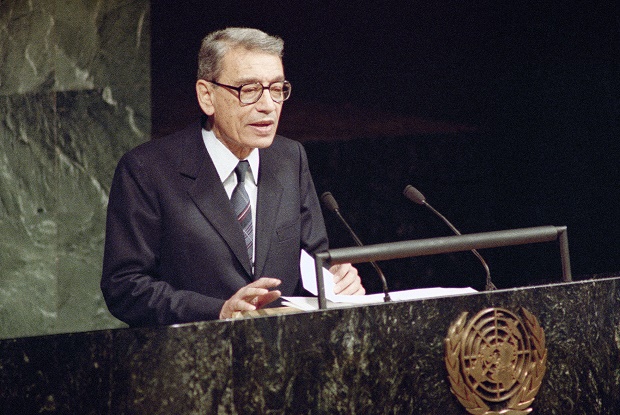
In this Tuesday, Dec. 31, 1991 file photo, Boutros Boutros-Ghali, then Deputy Foreign Minister of Egypt, addresses the United Nations General Assembly after being sworn in as the new U.S. Secretary-General in United Nations. The U.N. Security Council has announced on Tuesday, Feb. 16, 2016 the death of former U.N. Secretary-General Boutros Boutros-Ghali. AP File Photo
UNITED NATIONS, United States—Former UN secretary-general Boutros Boutros-Ghali, who led the world body from the hopeful times that emerged at the end of the Cold War to the massacres in Rwanda and Bosnia, has died at the age of 93, the United Nations announced Thursday.
The Egyptian diplomat became the first secretary-general from the African continent in 1992, but his tenure ended abruptly after five years when the United States vetoed his second term.
Boutros-Ghali, who served as the United Nation’s sixth secretary-general, died in Cairo, a UN spokesman said.
UN Security Council members observed a moment of silence in memory of Boutros-Ghali during a meeting in New York.
A former Egyptian foreign minister, the veteran diplomat headed the world body during one of its most difficult times with crises in Somalia, Rwanda, the Middle East and the former Yugoslavia.
After a series of clashes with the US administration, Washington turned against Boutros-Ghali and decided to back Ghanaian Kofi Annan for the top post.
Relations with the United States began to sour in late 1993, when a US-led operation in Somalia led to major casualties among American troops.
The operation, part of an overall UN effort to provide humanitarian aid that was being blocked by a civil conflict, led to acrimony between the US authorities and the world body.
Clashes with the US
Further problems emerged during peacekeeping operations in the former Yugoslavia, and after the genocidal massacres of 1994 in Rwanda, which the United Nations failed to halt.
There was also friction over UN sanctions against the regime of Saddam Hussein in Iraq, which had invaded and then been ejected from Kuwait a year before Boutros-Ghali took up his post.
Washington’s then ambassador to the United Nations, Madeleine Albright, argued that Boutros-Ghali had failed to enact reforms needed to make the world body more efficient.
When his candidacy to serve a second term was vetoed by Washington, Boutros-Ghali felt that he was being punished for pushing UN member states to pay their membership arrears—an issue on which the United States has long been a laggard—and for condemning Israeli actions in southern Lebanon.
After leaving the United Nations, Boutros-Ghali served as secretary-general of the Francophonie group of French-speaking nations.
Boutros-Ghali was born on November 14, 1922 into a Coptic Christian family in Cairo.
He was educated at Cairo University and in Paris, where he established a lifelong connection with France.
After a university career centered on international relations, including a spell at Columbia University in New York, he became Egypt’s foreign minister in 1977, under president Anwar al-Sadat.
He accompanied Sadat on his ground-breaking trip to Jerusalem in that year, an event which both forged a peace agreement between Egypt and Israel and led to Sadat’s assassination four years later.
RELATED STORIES
UN chief hopes for agreement to visit North Korea soon
N. Korea cancels Ban Ki-moon visit, says UN